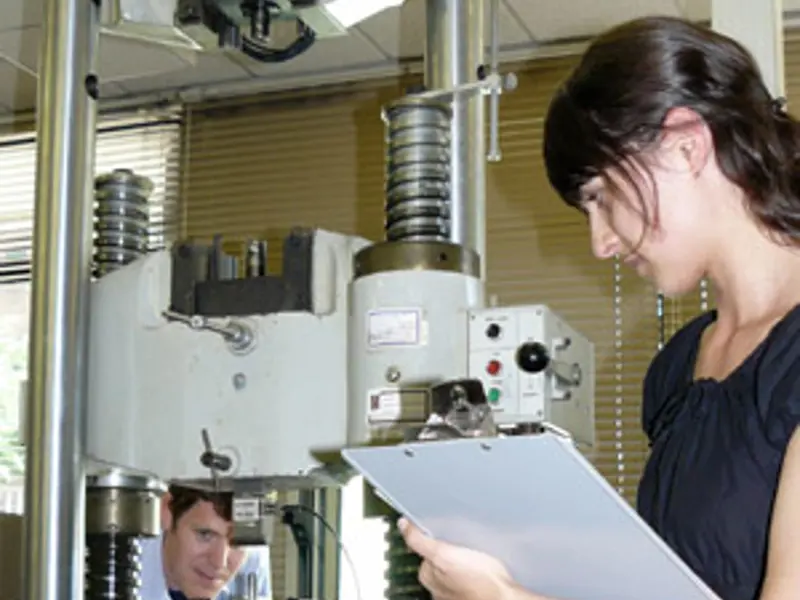Level 3 Certification
The Level 3 Diploma provides a qualification for engineers and senior technicians having considerable responsibility for strain gauging and strain measurement. It shows that the holder has a broad knowledge of strain measurement methods and component behaviour, and is able to evaluate strain gauge installations and use strain gauges to determine accurate values of stress and the output of strain-gauged sensors.
Corresponding details of the the Level 1 and Level 2 examinations can be found on the Training and Certification main page and full details of the scheme are given in the Certification document.
A list of upcoming examinations and courses are listed on the Training & Certification Events page.
All courses can be taken independently and taking an exam is optional.
Entry Requirements
|
Direct entry to Level 3 certification is not possible. All candidates must have attained Level 2 certification and it must still be valid in order to proceed to Level 3. The required level of training and experience is: 3 days TRAINING and 9 months EXPERIENCE (for candidates with a HND or Degree) |
Registration
All new candidates for the examination must register online. All forms must be received by the BSSM office at least 5 weeks before the date of the examination.
Registrations for examination are confirmed after a review by the Chairman of the Certification Committee. Each registered candidate is then provided with a sample practical examination paper, a sample written paper, and the bank of questions for the written examination.
Most candidates chose to attend the course, pre-exam seminar and examination as a complete package.
Stress Analysis and Load Measurement Course (3 day)
The Stress Analysis and Load Measurement course provides instruction on the siting of strain gauges and the choice of gauge systems; it covers strain measurement, the correction of measured data, the determination of stress and yield load, the use of full-bridge circuits, the principal features of common load cells and the refinement of the bridge circuit.
The course uses lectures and hands-on experience to provide participants with a deeper understanding of strain measurement, in order to improve the accuracy of data they use in the determination of stress levels and critical loads in structural components, and to appreciate design features incorporated in devices used to measure load. Previous experience with strain gauges is essential.
Pre-exam Seminar
Examination
The objective of the examination is to enable candidates to show that they have a broad knowledge of strain measurement methods and component behaviour, can evaluate strain gauge installations made by other personnel, and can make measurements using strain gauges and determine accurate values of stress.
- A practical test
- A written test
- An interview
- A stress analysis task using pre-installed strain gauges, is based on measurements using strain gauges already installed on a component. It normally includes the use of rosettes, the correction of raw data, and the determination of principal values and the yield load.
- A load measurement task using pre-installed gauges is normally based on a body carrying six gauge grids. Appropriate grids are selected and used in a bridge circuit to achieve relationships between load and the bridge output.
- A written evaluation of a strain gauge installation, which requires the preparation of a short report. This is usually based on an examination of the installation, and the original specification for the installation.
The written test is held on the morning of the second day and has two sections:
- A basic section, containing questions based on general knowledge related to
(a) component behaviour and
(b) methods of strain/stress analysis - A section containing questions based on the use of strain gauges
The interviews are held after the written examination on the second day. The interview is conducted by three members of the Certification Committee and lasts around half an hour. It is concerned with:
- Education and training
- Experience in the analysis of strain and stress
- Understanding and breadth of knowledge of strain measurement and stress analysis methods
- Responsibility for gauge installations and test programmes
- Supervisory experience
The candidate is expected to submit a summary of relevant work done over a period of around two years. At the interview candidates normally use additional supporting material such as photographs, drawings, graphs, models, samples and components.
Renewal of Certification
The award is valid for 5 years.
At the end of each 5 year period, certification can be renewed by either completing a practical test and submitting a review of recent strain measurement and related experience, or using the Credit Scheme, which is described in the Certification document. The practical test will include design of tests and gauge installations, inspection of gauge installations, measurements, calculations, and the consideration of alternative methods. Candidates will normally do the tasks at their workplace, under the supervision of a senior colleague, who will be required to confirm the candidate’s experience and that the renewal tasks were done by the candidate. There is not be a limit on the time taken to do the tasks.
Candidates applying to renew their certification and those making use of the credit scheme should also complete the registration form.
Meet your instructors

Richard John Greene
Richard has experience of full field strain measurement, strain gauges, digital image correlation, thermoelastic stress analysis and photoelastic stress analysis
He currently delivers strain gauge installation courses and seminars on behalf of the Society, mostly at levels 2 and 3 of the Certification scheme.

Anton Chittey
Presenting training workshops has been a key part of Anton's career including those on behalf of the BSSM.
He has been a member of BSSM’s CERCO committee for several years which includes the role of examiner for the strain gauge installation Certification scheme.
2025 Prices
Level 1
Pre-exam seminar £385
Exam £625
Exam (2 installation types) £750
Renewal £385
Level 2
Pre-exam seminar £385
Exam £880
Renewal £385
Level 3
Pre-exam seminar £470
Exam £1025
Renewal £385
Courses
Strain Analysis using Resistance Strain Gauges course £1770
Stress Analysis & Load Measurement course £1440
All prices ex VAT

Continued Professional Development (CPD) for Early Careers
The BSSM is ahead of the game when it comes to encouraging early career development. We offer membership, courses, competitions, conferences and networking opportunities in a relaxed and friendly environment.
Training & Certification
Our courses include Stress Analysis and Load Measurement, Strain Analysis, Certification Seminars and Exams.
In addition we offer tailor made courses to suit your specific needs and run these at your company premises
